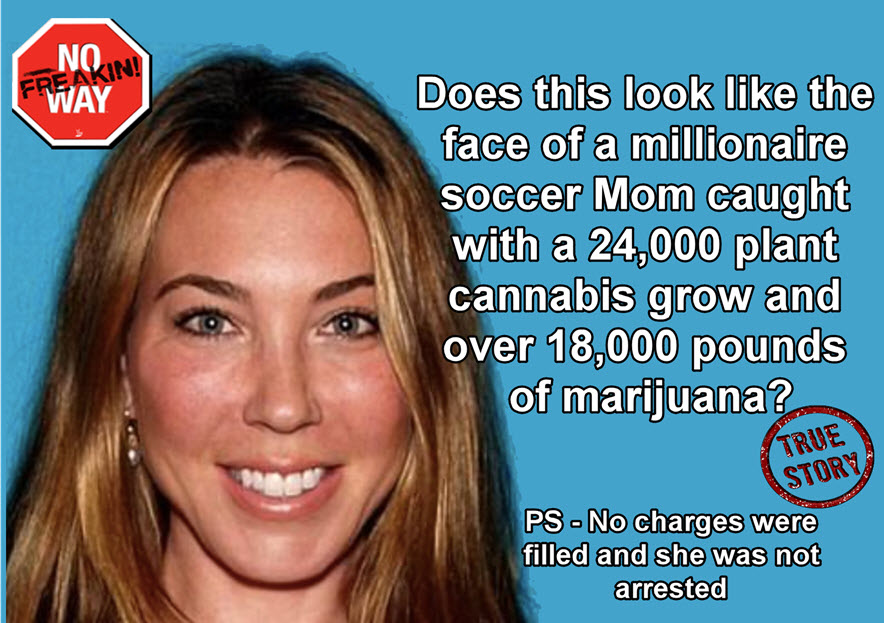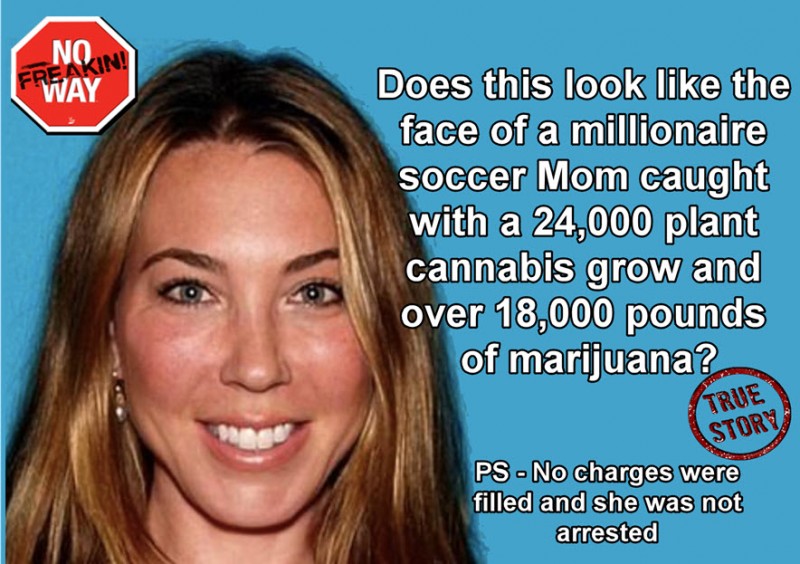Soccer Mom Caught With Multimillion Dollar Cannabis Grow - No Charges Filed, No Arrest Made

A San Bernardino mother was taken into custody by authorities after cops discovered a massive unlicensed cannabis grow in her home with more than 24,000 plants.
Stephanie Smith, 43, was the target of a raid last Wednesday when cops raided her property after being tipped off about her massive pot grow in an empty warehouse. The size of the grow led the police to think that the alleged drug queen was profiting millions of dollars monthly.
Two months ago, neighbors began complaining to investigators, who became even more interested in the case when they saw that the supposed empty warehouse had an electric bill of around $67,000 a month. The abandoned warehouse was protected by a 12-foot metal rolling fence, security-enhanced doors, surveillance cameras, and a large concrete wall surrounding the parking lot. They found a 4-story warehouse where cannabis plants were being cultivated beneath heat lamps with a high-tech irrigation system. Feds and police raided Smith’s 3 properties in Pacific Palisades, and ended up confiscating 18,000 pounds of cannabis.
“In my 26 years, it was the biggest grow that I’ve ever seen,” says Lt. Mike Madden of the San Bernardino police. “There were all different rooms for different processes and hydration, filtration, and ventilation. It was pretty expensive.”
According to CBS Los Angeles, the cops didn’t arrest Smith or charge her with a crime. However, they detained 8 people who were working in the grow houses.
Even if California voters approved cannabis legalization, it’s mandated that growers need to apply for licenses and permits from the local government. “Marijuana has been legalized, but there are stringent requirements,” says Madden. “It’s not that you just get to set up shop where you want to set up.”
The cops say that the size of the grow is associated with that of a drug lord.
California’s Cannabis Laws Are Confusing
California is known to have lax laws, but not this lax. The Golden State is one of 29 where cannabis is legal for either medical or recreational purposes. Additionally, California just granted 20 initial temporary licenses that are good for 120 days; another milestone towards legalization. And come January 1, 2018, California will allow adults aged 21 and up to use cannabis recreationally. California as well as its cities will be creating new regulations for cannabis use.
Given that California is the largest state in the country and a major player in cannabis legalization, doing it right this time around may actually help end the drug war. But with legalization comes the tedious task of regulating the $7 billion industry; permits, taxes and all. California’s “live and let live” approach for cannabis use may now change, and Smith’s arrest may trigger even more aggressive law enforcement in the state so that businesses in the black market are now out of the shadows.
Policing illegal cannabis use isn’t an easy task, even in this day and age. If compliance is too lax and permits and taxes are too easy, California’s new cannabis industry could be afflicted by illegal operations but if it’s the opposite, many businesses such as Smith could choose to stay in the shadows. So how will California’s governments strike a balance?
Another challenge is that California is known to be slow in issuing regulations to oversee the various frameworks meant to guide both medical and recreational use. Even though medical use in California has been legal since 1996, it’s still considered poorly regulated. California’s cities have the liberty of choosing whether or not to issue permits but many of them are still confused about what to do. The municipalities that have issued regulations have such varying standards that the laws in California’s market alone could be described as a medley of rules at best. What’s worse is that the federal government makes everything so much more difficult because cannabis is still a federally prohibited drug, creating a legal jeopardy even for licensed businesses particularly considering the fact that cannabis ops remain to work on an all-cash basis.
California’s cannabis market could benefit from more capitalization to fund the necessary infrastructure to make it successful. This includes laboratory testing, distribution, and compliance systems.
OTHER STORIES YOU MAY ENJOY...
CONFESSIONS OF A STONED SOCCER MOM, CLICK HERE.








